Learning Recovery
Assessments | Neurotherapy | Courses
Cambridge, England
Assessments
To answer questions like: “how can my child (or me) seem so bright and yet fail all the tests”. What can I do?

Neurotherapy
To answers questions like: “What can I do to get a brain that helps me think, sleep, concentrate and learn better.


Courses
To answer questions therapists ask themselves, like: “How can I learn enough about the brain to help others”.

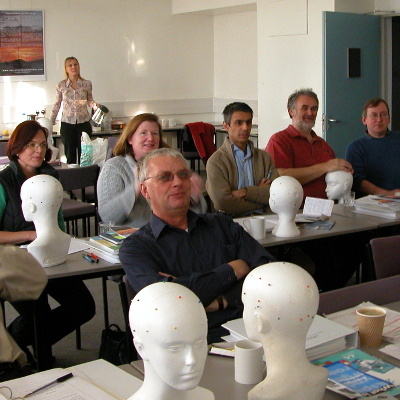
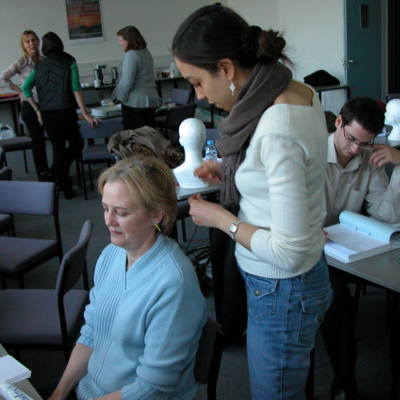
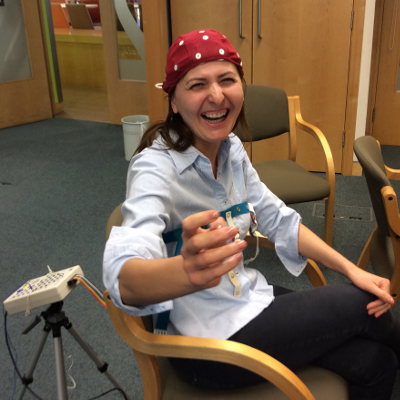


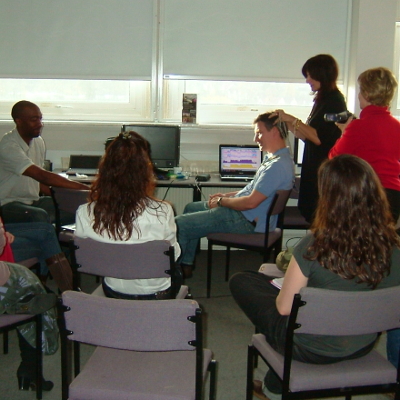
Neuroeducational
A Neuroeducational perspective looks at learning ability through evolution. This means there is a continuum from Neurotypical to Neurodiverse and we are all somewhere on this continuum. Learning requires several capacities from ability to register sensory information in the right sequence, to categorising and memorising it. Learning is not an even experience unfolding linearly as the teacher imparts knowledge. Not only are there fast and slow learners who need a different pace but there are fast and slow learners in different subjects according to their learning preferences.
For example there are good readers who take longer than their peers to get geometry or science and weak readers who can virtually run the class I.T. programme without the teacher.
Or the kids who are great at the detail needed for Maths or fine Art but are overwhelmed by simple PE instructions or classroom discussion.
And then there are the talkers who can’t seem to write as well as they can talk and the class clowns who can’t maintain attention on anything for more than a few seconds so different to the kids who work so hard, but so slowly, making sure everything is right.
Then there are those who seem to understand everything first time round but then forget it all when the exam comes along
None of these children are likely to reach their intellectual potential without some understanding of their strengths and weaknesses. This describes maybe a third of all learners who frustrate their teachers and disappoint their parents and become a drain on society when they could be assets.
At our neuroeducational clinic the brain basis of these learning abilities can be assessed with neurological and psychometric measures. A diagnosis can be provided and reports for the school and home, outlining best teaching and parenting strategies.
Stress of learning
School is stressful to children who have any type of leaning difficulty, a 6 hour, 5 day a week stress, at least. For those that are understood, helped to use strategies and develop some competencies, this stress can be turned into a challenge, a determination to rise above weaknesses and the consequent triumph of mastery over negative circumstances. For others, who are thought lazy by their parents or not too bright by their teachers, school becomes a daily dread, spiraling into low self-esteem, under-achievement and depression.
But it is not the stress itself that is harmful, it is the belief that you can do nothing about the circumstances that control your life. It is rarely the chief executive juggling between 6 phones, 3 cities and a dozen meetings who collapses from stress. It’s the cog-in-wheel who has no control over the job, how they do it, how long they will have it… who can be made redundant no matter how hard they try to do a good job. So eventually they don’t try, because this is stress that is demotivating. Parents too, experience this stress, no matter how much they put into it, there is no guarantee that the kids will come home for Xmas or not become delinquent, drug addicted or depressed.
It is the feeling of being able to cope with whatever life throws at you that is the stress-proofing armour. Children build up these feelings of control with the help of their parents, who stand on the side-lines, coaching, encouraging independence and ready to step in with the safety net to prevent too severe a plummet to ground. It is this prior experience of mastery which an individual can generalize to a new situation that makes the difference between an exhilarating stress and an overwhelming one. But this prior experience is hard for a child with specific learning difficulties to build up.
They learn too soon that there is a situation they can’t control, an adversity like not being able to read – or write; or pay attention or catch the baton in the school relay race or make sense of numbers. These are the Dyslexic, Dysgraphic, Attention-Deficit, Dyspraxic and Dyscalculic children, respectively.
Nowhere is the discrepancy between what you put into something and what you get back more poignantly reflected Than between the potential of children with specific learning difficulties and their performance; most painfully obvious to the children themselves, at school, every day.
Take the Dyslexic child. He or she may have many advantages; parental backing, an understanding school, good Genes and problem-solving ability, comfortable life style, bubbly personality, or other talents such as music, drawing or sporting ability. But none of these can overcome the stress of finding that, despite their efforts, they can’t make sense of those squiggles on the page, when everyone else in the classroom seems to be able to do so.
Or the Dysgraphic child, who can rattle on fluently about some subject, picking out interesting threads, weaving in subtle complexities and yet, who after an hour will turn in a written account of that subject consisting of 3 illegible sentences. But I tried so HARD!, is the true response to the admonition of the teacher.
The attention-deficit child wishes they weren’t the scapegoat. They don’t want to feel unhappy, but they do. And the more they express this in bad behaviour, the more opprobrium they attract, the worse they feel. In quiet moments they will admit to wanting to learn, to be liked, to be competent, but something always happens to stop that. They will try to concentrate but within minutes they are thinking of something else, their attention has been dragged away by the slightest noise, movement or sight. Life seems very unfair to them, there is little relationship between their resolve and the result.
The Dyspraxic child is just as unhappy. Usually labelled the “clumsy” one their lack of rhythm or grace attracts bullying. Their emotional touch-paper is just too inviting for other children not to light it and step back to watch the explosion. Always one step (or more) behind in getting to the right place they miss things and feel constantly out-of-place, incompetent and unable to control their own feelings let alone anyone else’s.
The Dyscalculic child, like the Dyslexic can’t seem to make sense of numbers, and can be shown over and over again but will still make errors the whole class giggles about. This can affect their performance in the sciences where graphs and measurements have to be made, so there are plenty of opportunities for decreased self-esteem for this child too.
What can a worried child conclude?
“It must be me, my fault” (self-blame is the first element in the stress factor)
Furthermore, our child concludes
“it’s going to affect everything else, from the ‘make yourself a dinosaur kit’ to science”
And worse, our child thinks
“it will always be like this”
These three negative beliefs are the recipe for rising stress and eventual demotivation as the child decides that he or she can never do it so they might as well not try. As they generalize their specific learning difficulty to previously good subjects alternatives to self-esteem are sought. This is anything that doesn’t involve reading, writing, sports/games or calculating and can range from maladaptive strategies like class clown/bully to artistic, musical and computing abilities – f they have the opportunity.
Now analyze any lack of parental or school support, unstable, unhappy home etc. And some parents can’t help taking on board any negative interpretations from the school (lazy, careless, unmotivated, even stupid), an added stress. Such early adversity generates a life-long vulnerability to stress,
It is the lack of advantages that determine the particular reaction to stress, from bad behaviour and truanting to anxious withdrawal. But even under the best circumstances and with good remedial teaching, children with specific learning difficulties are constantly working to the limits of their endurance. They put in so much for so little reward. That ‘unfairness’ is stressful. Lack of control starts when input and effort are not matched by outcome.
Even when adequate literacy, numeracy, motor or attentional skills have been achieved in later life there is a slowness in Processing rapidly presented information, visual, auditory or kinetic, now matter how intelligent the child. Words and numbers have to be listened to, remembered, and written down. Milliseconds in timing can make the difference between ‘getting it’ or not.
At the visual level some Dyslexics are not only slow hearers they can also be slow “see-ers” (see above notes on Dyslexia) of the printed word. Opticians and audiometricians can’t measure this and despite their complaints the child is often given a visual and auditory clearance and their symptoms dismissed as psychological, at best.
Fine and gross motor skills remain important throughout life as does the ability to concentrate and remember, so busy/noisy lecture rooms, projects or reports and memos read or written to a deadline are debilitating stresses to the adult who is coping with the residue of specific learning difficulties, when they may be only challenges to the normal reader and writer and memoriser. Exams are stressful for everyone but as much a matter of technique and confidence as knowledge, so are even more stressful to The specific learning difficulty child or adult who can least cope with the loss of rationality, memory and sequencing ability that desert everyone under stress.
Research shows that Dyslexics, Dyspraxics and some AD/HD children can take ten to twelve times longer to process information And to develop skills from letter formation to riding a bike. However, once achieving automaticity they can reach a competence similar to matched non-specific learning difficulty children.
Can…!
It is the negative or positive belief in the ability to cope that decides which side of the stress curve the Sp.ld child is going to be. Stress symptoms themselves are stressful, so as the average child develops more or less mastery of information at school or College, the misunderstood Sp.l.d individual develops stress symptoms more rapidly and more intensely, and it takes longer for those feelings to subside. These feelings are just as powerful in the adult sp.l.d individuals, possibly because they have been storing them up longer. The feeling of difference, especially when it is perceived negatively, grows stronger, and can make them isolate themselves from the support they would otherwise get.
It is up to us – parents, teachers and society in general, to see that the Sp.l.d child can grow into a Sp.l.d adult feeling worthy, hopeful and able to perceive inevitable stress as a challenge that can be surmounted.
And we can do that by expressing in word and action the conviction that:
(i) It’s not their fault (daddy’s genes, ear infections, birth trauma, immune reaction, prenatal nutrition) and more have been implicated over the years of research.
(ii) It doesn’t affect other abilities (Sp.l.d’s are unrelated to intelligence or other abilities such as general knowledge, musical or other talents.
(iii) It won’t always be like this (specialist remedial teaching, effective coping strategies, nutritional intervention, strengthening of sensory capacities) and information technology can be used to compensate. Anyway the 21st century will have a better place for the image makers than the word makers.
So instead of feeling useless, and that everything is hopeless and that nothing will ever change (the negative belief) the Sp.l.d. Child can be helped to feel that a specific learning difficulty is an obstacle that can be overcome and that they will get credit for being able to do so, (the positve belief).
This plan for guided mastery will allow the Sp.ld individual to feel they have a future they can work towards, where their potential can be fulfilled in some, maybe as yet unexplored way.
For good advice on how to maintain motivation and positive attitudes in Sp.l.d children see:
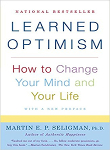
Seligman, Martin EP. Learned optimism: How to change your mind and your life. Vintage, 2006.
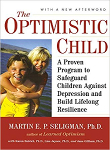
Seligman, Martin EP. The optimistic child: A proven program to safeguard children against depression and build lifelong resilience. Houghton Mifflin Harcourt, 2007.
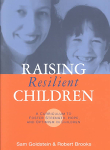
Brooks, Robert, and Sam Goldstein. Raising Resilient Children: Fostering Strength, Hope, and Optimism in Your Child. Contemporary Books, 4255 West Touhy Avenue, Lincolnwood, IL 60712-1975 (US, $22.95; Canada, $33.95)., 2001.
www.samgoldstein.com
The Brain Basis:
The major learning strengths and weaknesses are codified by the world’s Psychiatrists and Psychologists into a convenient classification system: The Diagnostic and Statistical Manual (DSM V) or the (ICD 10). This lists the following into Specific Learning Disorder or Neurodevelopmental difficulties:
Dyslexia (now Specific Learning Disorder)
Dyslexia with impairment of word reading (DSM-V: 315.00), Dyslexia with impairment in written expression (DSM-V: 315.2), or Dyslexia with impairment in mathematics (DSM-V: 315.1). Dyslexia is commonly understood as difficulty perceiving the phonemes (sounds) in words. The left hemisphere literacy circuit does not activate sufficiently to join the sight of the word to the sound of it, leaving the reader with compromised reading, having to remember words by their visual pattern causing slowness and inaccuracy in reading, spelling and writing.
Developmental Coordination Disorder
DSM-V 315.4 (F82), or the “clumsy child”. Gross or fine or both motor skills difficulties, motor cortex retardations and mistiming between the senses, affecting motor coordination, visual tracking and writing.
Attention Deficit Disorder
DSM-V: 314.00/0, depending on specific features shows some lack of activity across the frontal lobes where the executive functions are based. They are impulsive problem-solvers, often grasping the overall idea but miss all the details. In this broad category are the varieties of oppositional and conduct disorders. A subcategory of inattentive only kids are simply passive dreamers, highly distractible and forgetful, but very imaginative.
Asperger’s
The opposite pattern is the child who pays so much attention to detail they can’t see the whole, i.e. Asperger’s: (DSM-V: 299.00 F84.0). Their anxiety means they need familiarity, predictability, and sameness, opposite to the attention Deficit child’s need for novelty. .There is often temporal lobe inactivity and some frontal lobe dysfunction.
Reactive Attachment Disorder (RAD)
Less a specific learning difficulty than a trauma related difficulty that affects learning is Reactive Attachment Disorder which many children experiencing negative home circumstances will show. Their mistrust and anxiety makes them unavailable for learning.
Brain based treatment involves coaching the under or over active brain waves back into harmony with the whole brain waves. This is Biofeedback, Neurofeedback, transcranial direct stimulation, virtual reality and some specialist computer games.
Let’s not forget the problems of the gifted and talented children. Often seen as teacher’s pet and bullied, but also sometimes seen by the teacher as a bit too precocious, asking questions that no one else knows or wants answers to. The eagerness of this child to soak up knowledge can be seriously damaged by a school that insists on the “normal” way things are run in the classroom. Talent turns to boredom and bad behaviour.
When it comes to learning difficulties Beverley will identify the symptoms that are characterised as Dyslexia (reading problems), Dysgraphia (writing problems), Development Coordination Difficulty (motor problems) Attention Deficit Disorders, Memory problems or the social communication problems associated with Autistic Spectrum Disorders. All of these “labels” have a defined criteria published in the DSM (Diagnostic and Statistical Manual) 5th Edition and used by Psychiatrists and Psychologists to make diagnoses. Her reports will outline the problems and necessary remediation for the school and workplace. The Special Needs Section of the Education Act gives guidelines for the school’s recognition of the pupil’s special needs . This includes students in Higher Education who should apply for a Disabled Students grant that allows them many accommodations that will help them complete their course or degree successfully. These can range from extra time to complete written work to Library concessions, provision of notes and power points to reinforce the lecture, speech driven word processors, recorders, participation in specialist support groups and much other help. For adults, The Equal Opportunities Employment Act places a duty on employers to also provide as much as possible a “level playing field” for the worker who has some special needs. Provisions may be anything between the provision of information technology to revised working practices. Her reports are accepted at all levels of education and in the workplace. She does reports for adults whose special needs have not been recognised or accommodated for in the work place and has come to realise that the Dyslexic adult is made redundant because of their slowness in reading, while the Dyspraxic individual is seen as too clumsy. The ADHD worker is castigated for being too forgetful and the ASD worker too unsociable and eccentric. Thus their weaknesses are highlighted while their strengths that could be put to such good use in the organisation, are ignored. A report explaining this often helps the situation.
Learning:
Learning can be defined as an ability to receive, retain and exploit information and the ability to learn is called intelligence. When there is an abnormal pattern of information processing from the senses; visual or auditory, or at the motor level several types of difficulties occur, and affect aspects of measured intelligence, or I.Q. These range from a mild level which is more easily compensated for to more severe. Behind all specific learning difficulties is the brain’s inability to process information in proper sequence. Thus the individual cannot develop an automaticity in some linguistic, literacy, cognitive, motor or social skills. The less severely affected can develop coping strategies but these are always vulnerable to stresses, such as time pressure, competing other demands and so on.
The consequences we call Dyslexia, Dyspraxia, Dysgraphia, and Attention Deficit Disorder; depending on which pattern of neural networks are affected. Undiagnosed and untreated learning difficulties can lead to low self-esteem, maladaptive coping behaviors and even in some cases later delinquency or addiction
Trade-offs:
Beverley’s research highlights the trade-offs between strengths and weaknesses that underlie the words brain, (the lawyer who can’t ride a bike) or the visual brain (the Artist who can’t spell) or the analytical brain that can’t see the wood for the trees. When learning preferences turn to extremes we see the Dyslexic, Dyspraxic, Attention Deficit or Asperger’s Brains. Thus we are all on a dimension between words and images as well as attention to detail versus getting the big picture.
Neurotherapy
We provide a number of therapeutic interventions such as Neurofeedback, Virtual Reality Therapy (VRT) and Transcranial Direct Current Stimulation (tDCS).
Courses
Our Neurofeedback course aims to present a comprehensive approach to the clinical application of biofeedback and Neurofeedback. The courses are intended for
Psychologist: clinical, sports, educational, Psychiatrists, Educators especially Special Needs teachers, Rehabilitation therapists, Counsellors, academic researchers in Neuroscience, and the many diverse therapies practitioners than would like to add the insights of EEG to their field.
The courses cover the EEG of arousal and thus the brainwaves of alertness, stability and the modes of underarousal such as depression. Delegates will see the brainwaves associated with pathological states, specific learning difficulties such as ADHD, Dyslexia and Autistic Spectrum Disorders and the peak performance states that elite athletes, creative and mediators produce.
Upon completion of the course attendees will have gained a clear understanding of the capabilities of the EEG biofeedback process, how to evaluate clients with respect to EEG possible use and implement it on computerized instrumentation for use in their individual practices.
Testimonials
